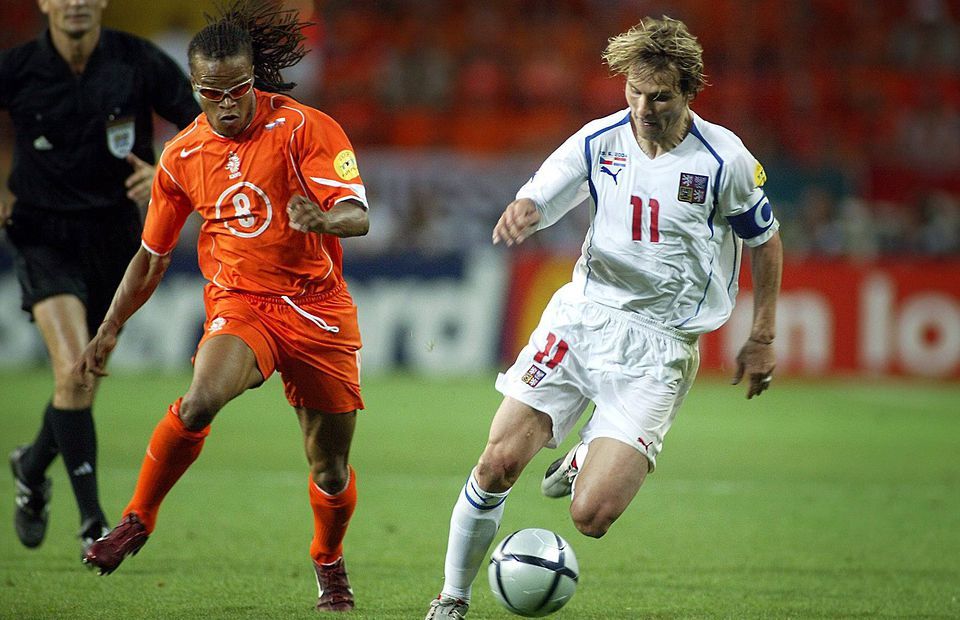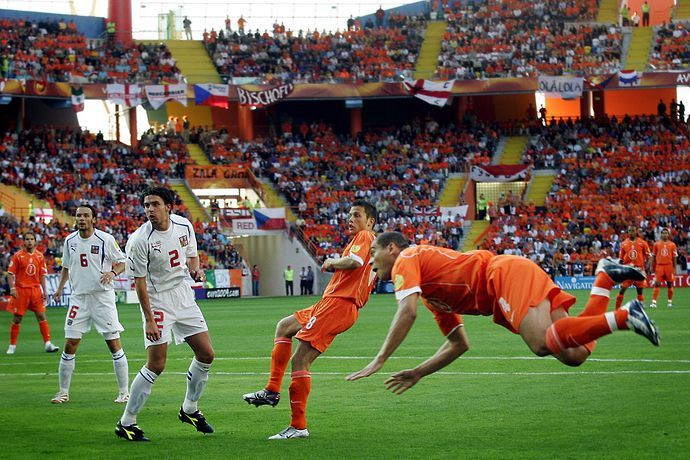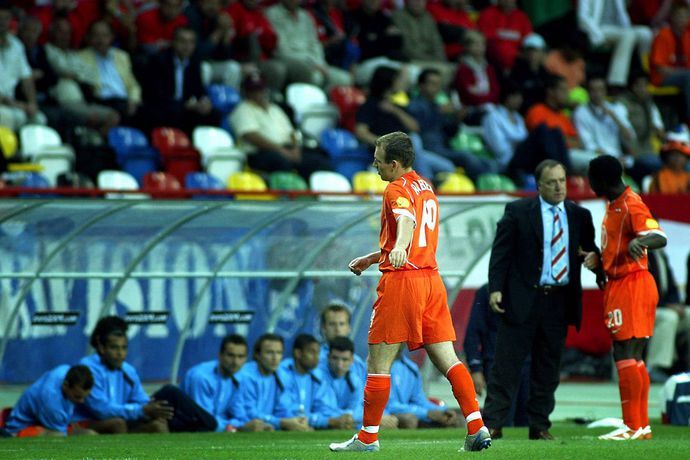If you fly to Portugal from the UK, chances are you’ll pass over the Estádio Municipal de Aveiro.
A colourful bowl inspired by the city’s bright houses, resident team SC Beira-Mar haven’t played in the Portuguese Primeira since 2013.
Despite this lack of recent top-level football, that’s not to say the stadium is without its highlights.
It’s hosted ten of the last twelve Portuguese Super Cups, alongside quite possibly the European Championship’s greatest ever game: 19 June 2004, Netherlands v Czech Republic.
Some four years earlier the teams had faced off in Amsterdam, with the tournament co-hosts winning late on through a Frank de Boer penalty in a game the Czechs largely controlled.
They got their revenge by topping qualifying Group 3 ahead of the Netherlands, forcing the Dutch into a play-off with Scotland.
As fate would have it, the two teams were drawn alongside each other once again in the Euros.
Four days previously the Czechs endured an almighty scare against Latvia, starting slowly and only winning 2-1 courtesy of a last-minute strike from substitute Marek Heinz.
Meanwhile, the Dutch required a late goal of their own to salvage a result, as Ruud van Nistelrooy equalised ten minutes from time in a 1-1 draw with Germany.
It was an underwhelming start for both teams, but a shock-goalless draw in the early game between Latvia and Germany opened the door for the Czechs or Dutch to take control of Group D.
Both certainly had the tools. Edwin van der Sar and Petr Čech were starting goalkeepers, whilst Clarence Seedorf, Edgar Davids, Pavel Nedvěd and Tomáš Rosický played in midfield.
With Arjen Robben, Jan Koller, Milan Baroš and Van Nistelrooy also on the Aveiro pitch, it didn’t take long for the game to explode into life.
A ball over the top from Rosický found the giant Koller, but the striker blazed a volley over. Marek Jankulovski then wasted another good chance for the Czechs.
Against the run of play the Netherlands got a free-kick, which Robben whipped towards the back post for Wilfred Bouma to drift in unmarked and plant a diving header beyond Čech.
By this point the game was four minutes old.
With the tone set, the pace continued. Seedorf curled a free-kick narrowly wide, whilst Robben was showing every time he touched the ball why Chelsea had recently paid £12 million to sign him.
On the twenty-minute mark the winger was released down the left, and he squared for Van Nistelrooy to side foot into a largely unguarded net.
A mere few minutes later the deficit was halved. A loose pass from Phillip Cocu was picked up by Baroš, who drove at Jaap Stam before twisting inside to find Koller.
Just afterwards, Davids hit the post.
The game was unrelenting, swinging from end to end in a joyous display of attacking football.
Even John Heitinga got in on the action, with the right-back unleashing a top corner destined half-volley that drew an unbelievable save from Čech.
At this rate, it’s impossible to detail every single chance in the game. Seriously, we’d be here all day.
Over the course of the ninety minutes there were 36 shots, 21 of which were on target.
In terms of what decided the outcome, there were two key decisions, both working against the Dutch.
The first saw Dick Advocaat bring the lively Robben off just before the hour, a decision which De Telegraaf labeled ‘an inexplicable substitution’.
The introduction of combative midfielder Paul Bosvelt was clearly an attempt to shore up the result, but in a game like this, the best form of defence was to attack.
That’s what the Czechs did, and they were level with twenty minutes left through a brilliant passage of play. A ball from Ballon d’Or holder Nedvěd was killed expertly by Koller on his chest, allowing Baroš to half-volley home the equaliser.
The second moment that tipped the game in the Czechs’ favour saw Spanish referee Manuel Mejuto González show Heitinga a harsh second yellow for a foul on Nedvěd.
With a man advantage, the Czechs really started to turn the screw.
Nedvěd hit the underside of the bar from a distance before the comeback was completed with just two minutes left.
Van der Sar spilled a long-range effort from Heinz into the path of Karel Poborský, who unselfishly squared for Vladimír Šmicer to cap the dramatic turnaround.
Back in Prague, newspaper Blesk poetically summed up the match as “much better than a Robbie Williams mega-concert or Giorgio Armani fashion show.”
The win meant Karel Brückner’s men became the first team to qualify for the quarter-finals, where they breezed past Denmark before losing 1-0 to a resolute Greece in the semis.
Meanwhile, the Netherlands bounced back from being “sick, broken and miserable”- as Van Nistelrooy put it - to beat Latvia 3-0 to qualify as runners-up.
After defeating Sweden on penalties, they too would also falter in the final four, this time to host nation Portugal.
They say no one ever remembers losing semi-finalists, but the streets will never forget the role both teams played in this encounter.






















